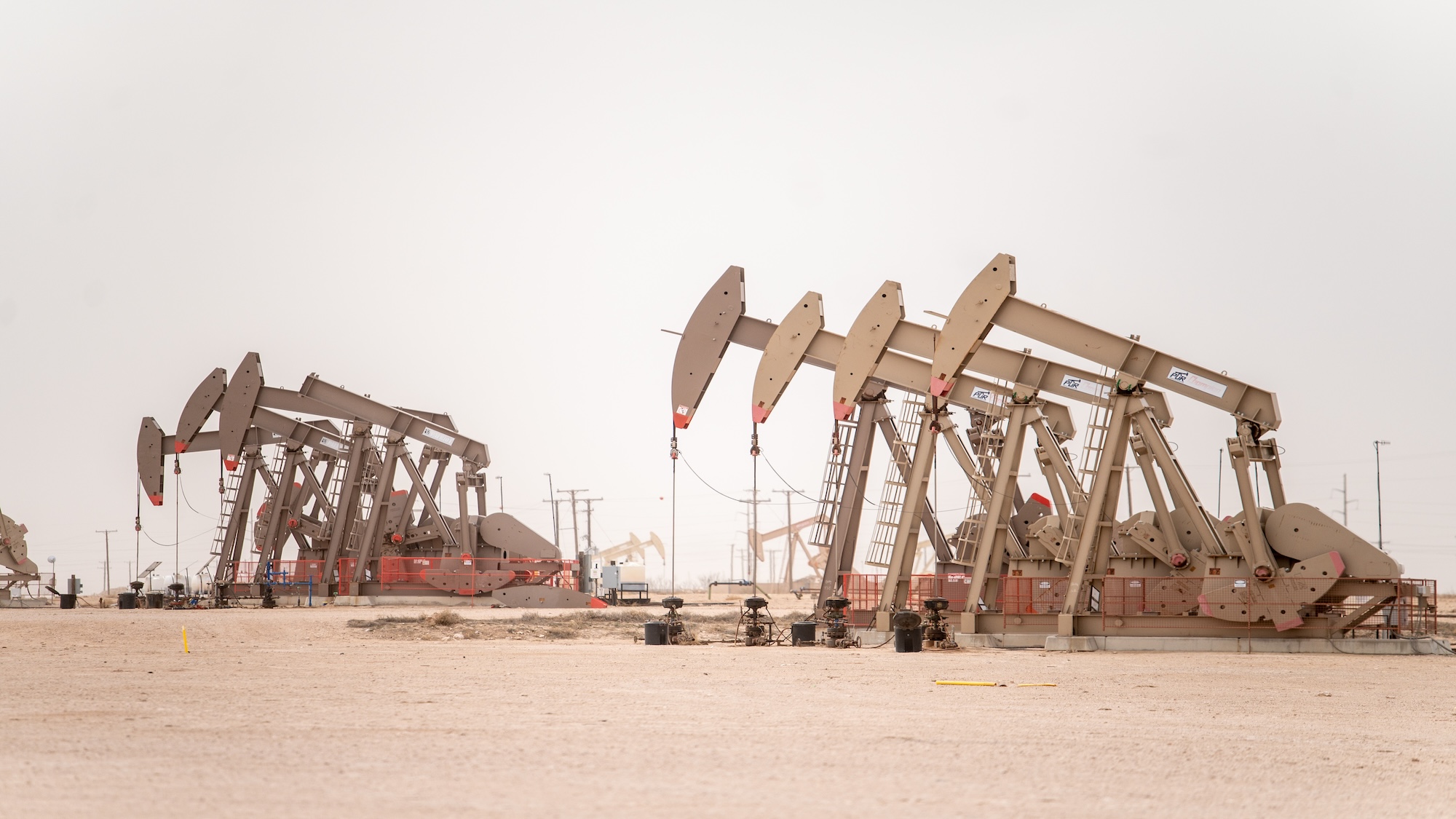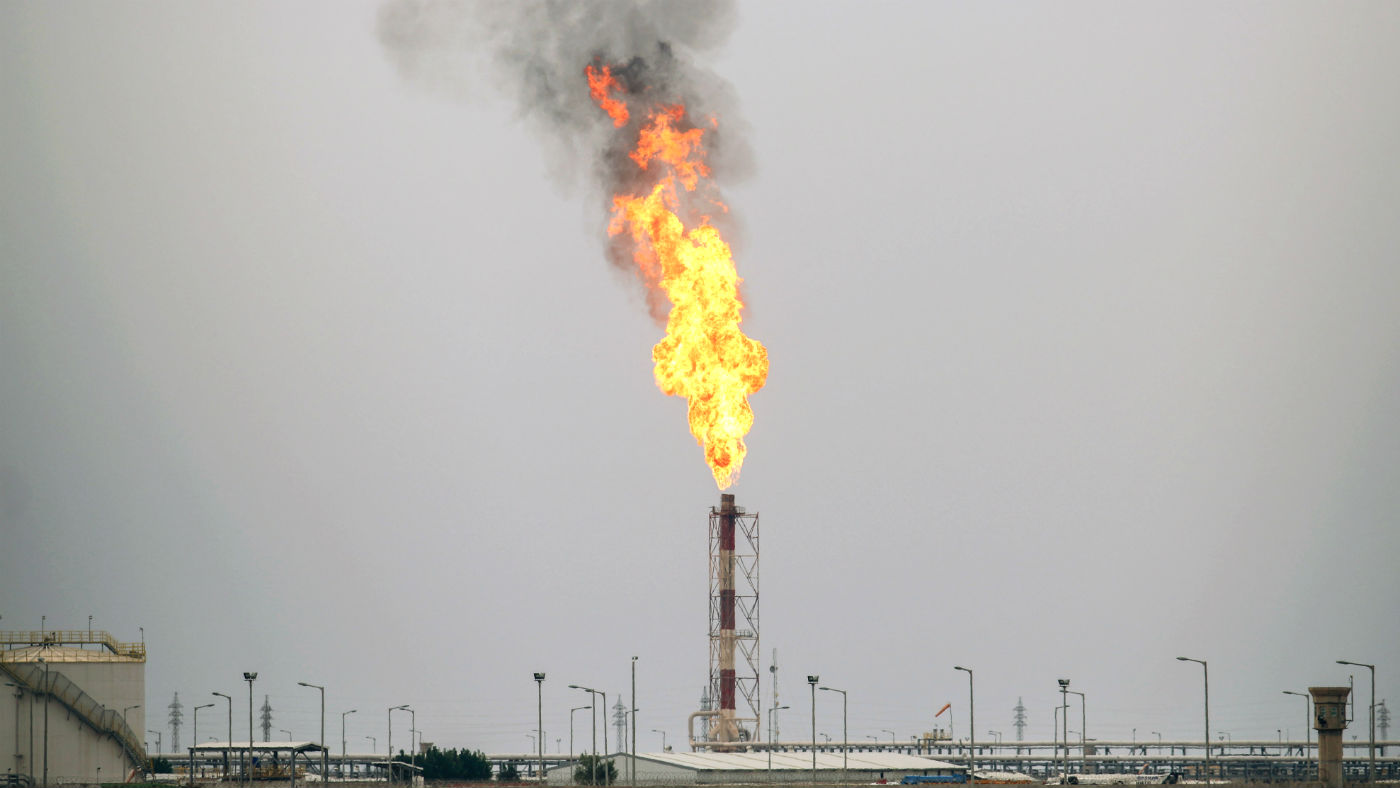Oil price posts two-year highs - but how long can it last?
Brent rose above $59 a barrel this week, its best third-quarter showing since 2004

A free daily email with the biggest news stories of the day – and the best features from TheWeek.com
You are now subscribed
Your newsletter sign-up was successful
Oil price: North Sea oil fields 'close to collapse'
19 December
The tumbling oil price has brought about a "huge crisis" for the UK's North Sea oil industry, an expert has warned.
With oil prices now below $60 a barrel, it is "almost impossible to make money", Robin Allan, the chairman of the independent explorers’ association Brindex, told the BBC.
The Week
Escape your echo chamber. Get the facts behind the news, plus analysis from multiple perspectives.

Sign up for The Week's Free Newsletters
From our morning news briefing to a weekly Good News Newsletter, get the best of The Week delivered directly to your inbox.
From our morning news briefing to a weekly Good News Newsletter, get the best of The Week delivered directly to your inbox.
"It's a huge crisis. This has happened before, and the industry adapts, but the adaptation is one of slashing people, slashing projects and reducing costs," he said.
The announcement came after a volatile day of trading. Brent crude, the global benchmark, ended the day down 1 per cent at about $60 per barrel after having risen by as much as 3 per cent in intraday trading.
In recent weeks, oil prices have slipped to their lowest levels in five-and-a-half years following weakening demand and concerns of a global oil glut.
Up to £55bn worth of North Sea oil projects scheduled for 2015 could be cancelled due to the falling prices, the Daily Telegraph reports.
A free daily email with the biggest news stories of the day – and the best features from TheWeek.com
Concerns over the profitability of North Sea oil have increased since Opec voted not to cut production in an attempt to arrest sliding prices when they met in Vienna last month.
Iran's oil minister has publically criticised Opec's inaction. Bijan Zanganeh told the country's state petroleum news agency: "The prolongation of the downward trend of the oil price in world markets is a political conspiracy going to extremes."
Sir Ian Wood, an adviser to the British government, predicted that the lower oil price would have huge ramifications around the world, and could lead to a wave of job losses at North Sea oil field over the next 18 months.
The US-based oil company ConocoPhillips has already moved to cut 230 out of 1,650 jobs in the UK and some analysts predict that other large firms will make similar cost-cutting announcements in the coming months.
However, the Department of Energy and Climate Change said yesterday that even though reductions in oil prices have proven "very challenging" for companies active in the North Sea, "we have seen very little evidence of new projects being cancelled or deferred in reaction to lower oil prices".
Oil price: Opec 'will let oil price fall below $40'
16 December
As the price of Brent crude fell below $60 for the first time since 2009, the most powerful nations in Opec have made clear that they are willing to push prices as low as $40 a barrel in their bid to take on Russia and US shale, a high-profile Gulf oil minister said this week.
Suhail al-Mazrouei, energy minister of the United Arab Emirates, said that the organisation will let prices fall by more than $20 per barrel before they consider an emergency meeting to cut production.
"We are not going to change our minds because the prices went to $60, or to $40," he said.
Brent crude, the global benchmark, fell by more than a dollar to $59.75 a barrel today, the BBC reports, while the price of US crude dropped to $54.85.
Tumbling prices have already had a profound impact around the globe, including in Britain where three times as many UK oil and gas firms have declared insolvency this year compared with 2013.
A report published on Monday by Moore Stephens, a UK accountancy firm, said that 18 UK oil and gas businesses became insolvent this year compared with just six in 2013, The Guardian reports.
Jeremy Willmont at Moore Stephens said: "The fall in the oil price has translated into insolvencies in the oil and gas services sector remarkably quickly. The oil and gas services sector has enjoyed very strong trading conditions for the last 15 years, so perhaps they have not been quite so well prepared for a sustained deterioration in trading conditions as other sectors would have been."
According to Willmont, expectations that prices will remain low for some time are fuelling the insolvencies: "There was a sharp drop in the oil price during the financial crisis, but the sense that oil prices could be depressed for some time is much more widespread this time around."
But George Osborne said that falling oil prices are "overall a very good thing", adding that the effect would be a "net positive" for both the US and the UK.
"We have important oil and gas industries in the US and the UK but nevertheless this is a big boost for American and British consumers and businesses," Osborne said at an address to the Economic Club of New York.
The Paris-based International Energy Agency recently slashed its forecasts for growth in demand for oil in 2015 by 230,000 barrels to 93.3m barrels per day. The estimations of the US Energy Information Administration are even more pessimistic; last week the department reduced its forecast demand growth for 2015 to 92.8m barrels per day.
Oil price: Opec is dead and oil could hit $50, says Bank of America
Oil prices could hit $50 per barrel in 2015 and Opec is effectively irrelevant, the Bank of America has suggested.
Francisco Blanch, the bank's commodity chief, warned that the consequences of Opec's decision not to stabilise prices at its last meeting will be "profound and long-lasting," and said that oil cartel is now "effectively dissolved".
Oil will now enter a period of wild price swings and "disorderly trading" that will benefit cash-rich Middle East petro-states such as Saudi Arabia, but will damage some of Opec's less wealthy members such as Nigeria and Venezuela, the Daily Telegraph reports.
The Bank of America said in its end of year report that as a consequence of falling prices, 15 per cent of US shale gas producers are already losing money and up to half of all shale operations will face financial difficulties if oil prices slip below $55 a barrel.
Years of oversupply in conjunction with developments in liquefied natural gas (LNG) have brought prices to their lowest point in five years. If the global oil glut is not brought under control, prices will slide towards $50, the bank said.
Citigroup disagreed with the Bank of America's assessment, suggesting that shale gas is more robust than their rival suggests, and will be able to weather prices nearer to $40 per barrel.
According to the end-of-year report, declining oil prices may lead to large-scale shale projects in Argentina and Mexico being scrapped, and could force some exploration in the remote areas of Russia and Canadian oil sands to be scaled back. Several major oil companies are also expected to cancel projects if the price of Brent crude price remains below $80.
In spite of the continuing freefall of oil prices in the months ahead, prices are expected to rebound in the middle of the year, said Sabine Schels, an energy expert for the Bank of America. "We expect a pretty sharp rebound to the high $80s or even $90 in the second half of next year."
Oil price: Brent crude rebounds from five-year low
9 December
The price of Brent crude rebounded on Tuesday afternoon after hitting a new five-year low of $66 per barrel, as some traders gambled that the prices had reached a floor.
After oil prices continued yesterday's downward trajectory in early trading, some buyers eventually emerged, apparently anticipating that prices are now bottoming in the wake of a 40 per cent slide since June.
The sharp drop in oil prices has been caused by rapid growth of US shale output and concerns that the global oil glut will continue well into 2015 following the decision of Opec not to cut production when the organisation met in Vienna last month.
Prices tumbled by almost $3 a barrel on Monday following a forecast from Kuwait that the cost per barrel would hover around the $65 mark until at least next summer. Kuwait is a key ally of Saudi Arabia and "follows the strategy set by the world's largest crude producer, which has triggered a price war with American shale oil companies", The Times says.
In spite of today's slight rally, many traders believe it is too soon to call a floor, Reuters reports.
"Although talks of oil reaching its bottom are more rampant, we fail to see a reversal coming without stronger fundamentals," said Daniel Ang of Phillip Futures.
Brent crude for January deliveries fell as low as $65.29, its weakest since September 2009, but was up 46 cents at $66.65 a barrel by 1.30pm GMT. US crude was up 64 cents at $63.69 a barrel, having plummeted to $62.25, its lowest since July 2009.
Oil price slips towards five-year low of $68 a barrel
8 December
The oil price has fallen by more than a dollar as it sinks towards its weakest point since October 2009 after Morgan Stanley forecast that oversupply would peak in 2015.
The investment bank cut its forecasts following Opec's decision not to reduce production to address the growing oil glut.
"Without Opec intervention, markets risk becoming unbalanced, with peak oversupply likely in the second quarter of 2015," Morgan Stanley said in a report dated 5 December.
In its report, the bank slashed its average 2015 Brent base-case forecast by $28 to $70 per barrel and for 2016, by $14 to $88 from $122 a barrel.
In its worst-case scenario, the report suggested that oil could fall to $43 in the second quarter of next year.
Today, Brent crude for January was down 90 cents at $68.17 a barrel, Reuters reports, having gone as low as $67.73 in intra-day trading, just slightly above last week's bottom of $67.53 – the lowest oil has fallen since October 2009.
Oil prices also dropped slightly following the publication of China's monthly trade data, which came in well below expectations. In November, Chinese imports fell by 6.7 per cent and exports grew just 4.7 per cent.
"We expect China's trade data to cause falling oil prices to fall further, as exports were lower than expected," Daniel Ang of Phillip Futures told CNBC. "Although lower imports would imply less crude imports, we attribute falling crude oil prices to be the primary reason for a reduced value of China's imports."
As a consequence of falling prices, British oil company BP announced that it would cut hundreds of back-office jobs around the world in downsizing measures.
BP said that tumbling prices underlined the importance of "making the organisation more efficient".
The company has 84,000 employees worldwide, including 15,000 in the UK, the BBC reports, but has been downsizing since the catastrophic Deepwater Horizon oil spill in the Gulf of Mexico in 2010.
-
 The ‘ravenous’ demand for Cornish minerals
The ‘ravenous’ demand for Cornish mineralsUnder the Radar Growing need for critical minerals to power tech has intensified ‘appetite’ for lithium, which could be a ‘huge boon’ for local economy
-
 Why are election experts taking Trump’s midterm threats seriously?
Why are election experts taking Trump’s midterm threats seriously?IN THE SPOTLIGHT As the president muses about polling place deployments and a centralized electoral system aimed at one-party control, lawmakers are taking this administration at its word
-
 ‘Restaurateurs have become millionaires’
‘Restaurateurs have become millionaires’Instant Opinion Opinion, comment and editorials of the day
-
 How might the Israel-Hamas war affect the global economy?
How might the Israel-Hamas war affect the global economy?Today's Big Question Regional escalation could send oil prices and inflation sky-high, sparking a worldwide recession
-
 Recent mega-mergers could signal a turning point for the US oil industry
Recent mega-mergers could signal a turning point for the US oil industryTalking Point Both Chevron and Exxon have recently spent billions to acquire smaller oil companies
-
 Has Saudi Arabia lost control of oil prices?
Has Saudi Arabia lost control of oil prices?Today's Big Question Kingdom goes it alone to cut production, risking tension with US and reigniting cooling inflation in Europe
-
 US angered by Opec+ oil cut
US angered by Opec+ oil cutSpeed Read Energy prices to rise further as producers slash supply by two million barrels a day
-
 Global oil demand forecast lowered for 2020 and 2021
Global oil demand forecast lowered for 2020 and 2021Speed Read IEA report says jet fuel demand remains the major source of weakness
-
 Are US-Iran tensions flaring again?
Are US-Iran tensions flaring again?In Depth Trump threatens military action over Twitter
-
 Can a deal be struck to raise oil prices?
Can a deal be struck to raise oil prices?In Depth Opec+ will convene today over video link in a bid to boost crude
-
 What do negative oil prices mean?
What do negative oil prices mean?In Depth Perfect storm of oversupply and storage shortages sees producers paying to get rid of US crude